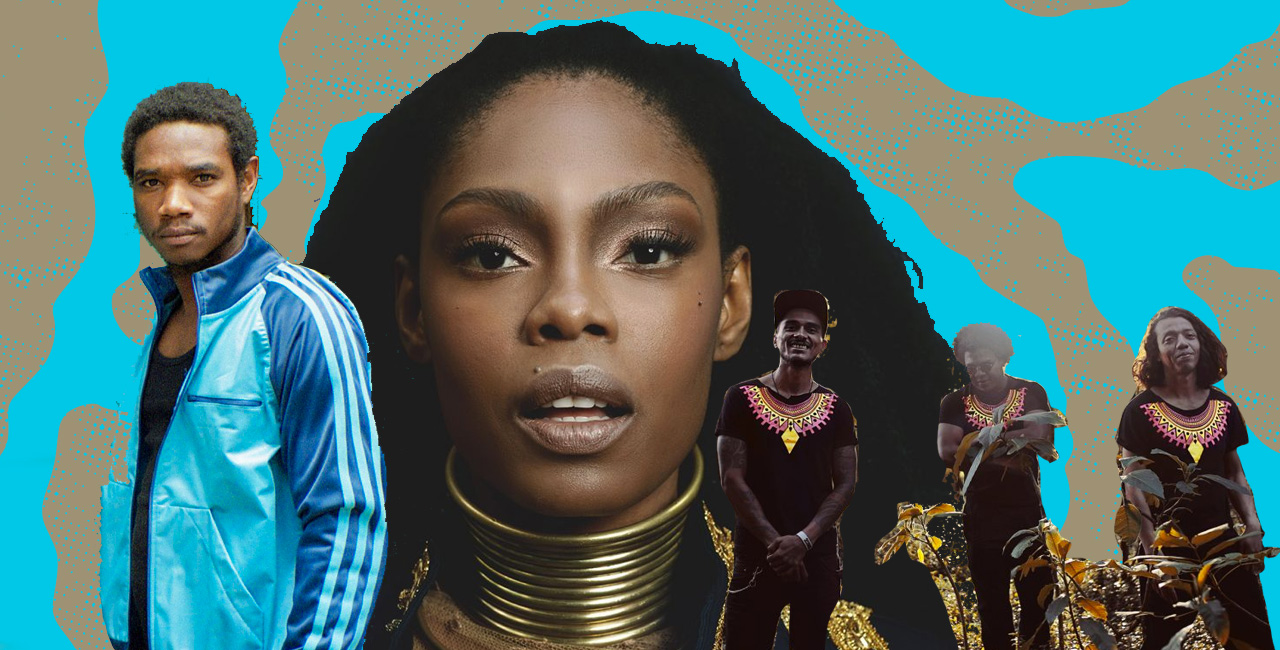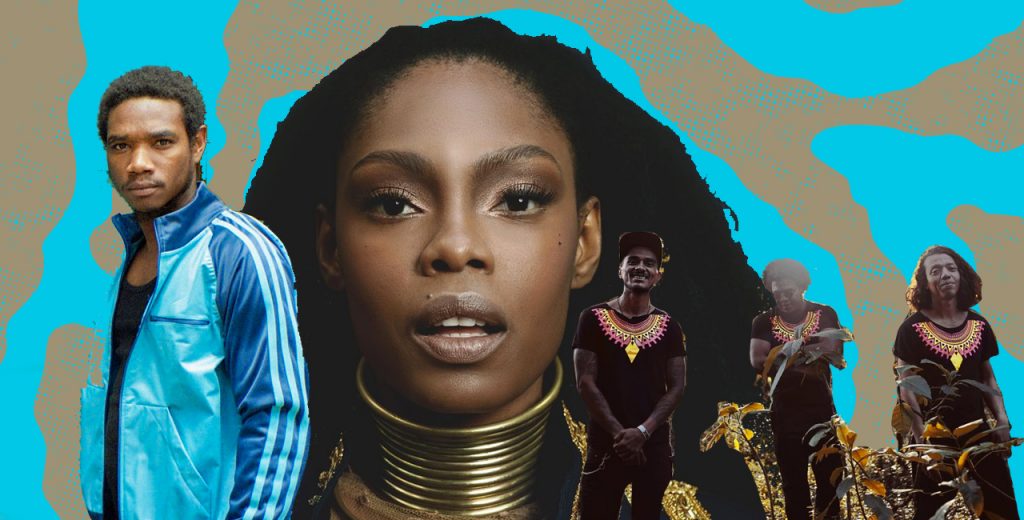For over a decade, Ibero-American electronic music has shown a special interest in folkloric sounds, and this exploration has inevitably led artists to tap into rhythms and music rooted in the African diaspora.
Peruvian duo Dengue Dengue Dengue, for example, have made music inspired by Afro-Peruvian rhythms, more notably on their Son de los Diablos EP. The irresistible drumming of bomba del chota, the Afro-Ecuadorian genre, has dressed EVHA’s beats on tracks like “Caminar a donde sea;” and Catalan producer beGun made an entire album of his own interpretations of styles and instruments from Africa.
Nicola Cruz, Quixosis, and more recently, Frikstailers, have all taken a shot at sounds from Africa and the African diaspora in Latin America. But what do all of these artists have in common? None of them are actually Afro-Latino. There is not a single Afro-Latino artist, for example, among the 13 producers tapped for the Afro-Peruvian-inspired Ritmo Diablo compilation put together by Terror Negro Records.
It’s easy to go to Afro-diasporic music for inspiration; after all, it’s magnetic, syncopated, and it’s arguably the root of most popular dance music. But today, more and more Afro-identifying artists in Latin America are committed to being the protagonists and narrators of their own history, and many of them are turning to their roots to find inspiration and raw material to proudly use in their own body of work.
This has been the case with Ibeyi, the French-Cuban duo who base their craft on their Yoruba and Afro-Cuban heritage. Another example is ÌFÉ; led by Otura Mun – an African-American man – the cast of musicians, some of them Afro-Boricua, also use music, instrumentation, and chants from Ifá to connect spiritually with religion.
While these are two of the most well-known examples, there are many other Afro-Latino artists who are reinventing their roots through electronic music, and we’ve curated a few whose music you should dive into. Check them out below, and stream our playlists on Spotify and Apple Music.
As always, our comment box is open for more recommendations.
Mitú (Colombia)
Alongside former Bomba Estéreo guitarist Julián Salazar, Franklin Tejedor brings the musical tradition of his hometown San Basilio de Palenque – the first free Black town of the Americas – to Mitú. Together, the duo creates a mutant concoction they call “techno-palenque.” With his production, vocals sung in Palenquero, and tambor alegre playing skills (which he extrapolates to electronic percussion), Tejedor is the beating heart of this Afro-futuristic fantasy, where rhythms like chalupa and bullerengue are in conversation with electronic dance music. Teresa Reyes, from the legendary San Basilio lumbalú ensemble Las Alegres Ambulancias, frequently lends her raw voice to their productions, drawing them even closer to black Colombia.
DJ Jigüe (Cuba)
DJ Jigüe is a mainstay name in Cuba’s underground music scene, both as an electronic music artist and as the founder of Guámpara, a music collective with black roots breaking stereotyped perceptions of Cuban music. A DJ and hip-hop culture original on the island, the Santiago de Cuba-born, Havana-based Jigüe now focuses on producing club tracks that connect Cuba, Africa, and the Caribbean horizontally; you can find him experimenting with makuta drums, kuduro beats, and dancehall references, sometimes all in the same song. He also champions the homegrown bakosó style, a recent hybrid between Afro-Cuban music and the genres under the Afrobeats blanket.
Xenia França (Brazil)
Salvador de Bahia artist Xenia França is in a journey to disseminate Afro-Brazilian culture in her country and beyond. Through Afro-diasporic music from the US – such as jazz and R&B – presented in an undeniably pop packaging, França incorporates the sounds of Yoruba batá drums, lê, rumpi and rum, typical of the Candomblé religion, to connect with her heritage on a more spiritual level. She also goes a step beyond and uses her lyrics as a platform to address topics like racism and black pride, as she does on “Respeitem Meus Cabelos, Brancos,” a Baiana response to Solange’s “Don’t Touch My Hair.”
Ghetto Kumbé (Colombia)
Reimagining their roots through neon-colored lenses, Colombian electronic music act Ghetto Kumbé seamlessly weave together African and Afro-Colombian music in their productions. El Guajiro, Chongo, and Doctor Keyta have a taste for more electronic Afro genres like champeta, Afro-house, kuduro, and azonto, but they also frequently nod to black folklore from both sides of the Atlantic with elements from chandé, chalupa de río, lamban, and kassá, among others. This is all wrapped up with a tight electronic production and fueled with the use of live tambor alegre, djembe, and dundun drums, which turn their shows into an all-around black experience.
Estación Sub_Trópico (Dominican Republic)
Santo Domingo trio Estación Sub_Trópico has found its place in the Dominican Republic spotlight thanks to its captivating live sets, where house music and Afro-Dominican folklore meet to induce trance-like states on the dance floor. Classically trained musician Marlene Mercedes, who’s also El Gran Poder de Diosa’s musical director, is the sole black member in the band, and wears the hats of keyboard player, percussionist, arranger, and producer. Together with Carlos Monción and Rocío Damirón, she creates spacey dance music with special emphasis on traditional percussion like palos, atabales, güiras, and panderos, as showcased on their only single to date, the merengue-driven “Drok-pa.”
Lord Breu (Brazil)
After cutting his teeth in the late 90s DJing dub, jungle, and ragga, Salvador de Bahia DJ and producer Claudio Araújo understood that the only way to find his own identity in the world of bass music was to look inwards. That’s when his Lord Breu moniker was born. Pairing up Northeastern Afro-Brazilian musical manifestations like samba de roda and afoxé –the secular version of Candomblé’s ijexá rhythm– with hip-hop, moombaton, Caribbean music, and even zouk bass, he produces his brand of what’s known as Bahia Bass, linking música baiana to other black styles to expand and spread his culture over the globe.
Ariwo (Cuba/Iran)
Ariwo – which means “noise” in Yoruba – is a London-based quartet formed by Cuban musicians Yelfris Valdés, Oreste Noda, and Hammadi Valdés, and Iranian composer Pouya Ehsaei. Together, they bend the sounds of their countries with an experimental approach, to create music that’s a bold example of a true successful cultural dialogue. With Valdés and Noda playing typical Afro-Cuban percussion such as conga, batá, and timbales, they conjure traditional rhythms like rumba, while Valdés bring the melodic and spiritual components through his trumpet and chants in Yoruba. They all coexist in harmony with Ehsaei’s avant garde point of view and Sufi sensibilities.




